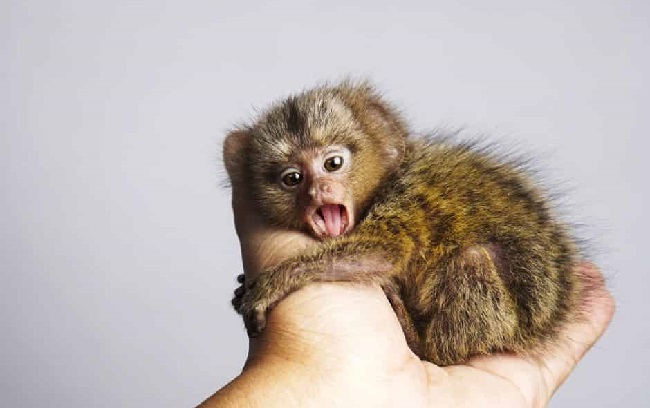Our fascination with monkeys and their playful, human-like behavior is nothing new. However, welcoming a monkey as a pet is a significant commitment and can be a complex affair.
In this comprehensive guide, we delve into the captivating yet challenging world of pet monkeys, discussing various species that could potentially be pets, along with a thorough understanding of their needs and legal implications of ownership.

Pet Monkeys Breeds
Here is a list of pet monkeys breeds:
Capuchin Monkeys
Widely recognized from films and television, Capuchin monkeys are small, intelligent, and trainable, making them popular as pets. They’re known for their curiosity and need for social interaction.
However, they require a significant time commitment and can live for around 40 years, so potential owners must be prepared for a long-term responsibility.
Marmosets Marmosets
They are tiny monkeys that are often considered easier to handle due to their size. They’re social creatures who require a lot of interaction and stimulation. A healthy diet and proper veterinary care are crucial for their wellbeing.
Squirrel Monkeys
Renowned for their playful and active nature, Squirrel Monkeys can offer a fun and engaging companion for the right owner. They require a large and secure enclosure for their acrobatics, along with a balanced diet and regular health checks.
Spider Monkeys
Spider Monkeys, known for their long limbs and tail, can also be considered as pets. They’re active, intelligent, and require a large space to move around freely. The care and commitment needed for these animals are substantial and should not be underestimated.
Tamarin Monkeys
Tamarin monkeys, characterized by their unique appearance and small size, can make fascinating pets. They are social creatures requiring companionship, and their diet consists of fruits, flowers, and insects.
Key Considerations for Owning a Pet Monkey
While monkeys can be enchanting pets, there are several factors to consider before welcoming one into your home:
Lifespan: Monkeys can live for several decades, necessitating a long-term commitment.
Space: They require ample space to explore and play.
Social Interaction: Monkeys are social animals and thrive on interaction.
Legal Restrictions: Many regions have strict laws and regulations about owning exotic pets. Potential owners must ensure they are compliant.
Health care: Exotic pets need specialized veterinary care, which may not be readily available in all areas.
Legal Implications of Owning a Pet Monkey
It is critical to understand that many regions and countries have strict regulations or outright bans on owning monkeys as pets. Each U.S. state has its own laws concerning exotic pet ownership, with some states requiring permits, and others prohibiting it entirely.
Internationally, laws vary even more. Potential owners must do extensive research and secure any required permits before adopting a pet monkey.
The Challenges of Monkey Behaviour and Temperament
While monkeys can be friendly and playful, they can also exhibit challenging behaviors, especially as they reach maturity. Biting, aggression, and destructive behavior are possible, particularly if they are not provided with enough stimulation or if they feel threatened.
Monkeys also communicate using complex vocal and visual signals that humans may not understand, leading to potential misunderstandings and conflicts.
Health and Dietary Needs of Pet Monkeys
Caring for a monkey’s health requires specialized knowledge and resources. Monkeys require a balanced diet, typically consisting of fruits, vegetables, nuts, seeds, and certain animal proteins.
Their diet can be complex and varies among species. Regular check-ups from a vet experienced in exotic pets are essential for monitoring and maintaining their health.
Emotional Requirements of Pet Monkeys
Monkeys are highly social creatures, and in the wild, they live in large family groups. As pets, they need a significant amount of social interaction and mental stimulation.
They are intelligent and curious animals, and without enough interaction, they can become depressed or anxious.
The Ethical Consideration of Owning a Pet Monkey
Before choosing to adopt a monkey, potential owners must consider the ethical implications. Many experts argue against keeping wild animals as pets because it can be challenging to provide an environment that caters to their physical and psychological needs.
In addition, there are concerns about the illegal pet trade, which often involves capturing monkeys from the wild and selling them, which contributes to endangering wild populations.
Conclusion
Although pet monkeys can bring joy and offer an extraordinary pet experience, they require a high level of commitment and dedication. Prospective owners must take into account their long lifespan, extensive care needs, and potential legal restrictions.
Owning a monkey is not a decision to be taken lightly and needs thorough research and preparation. However, for those willing to commit, pet monkeys can offer an unparalleled bond and a unique journey into the world of exotic pet ownership.
























